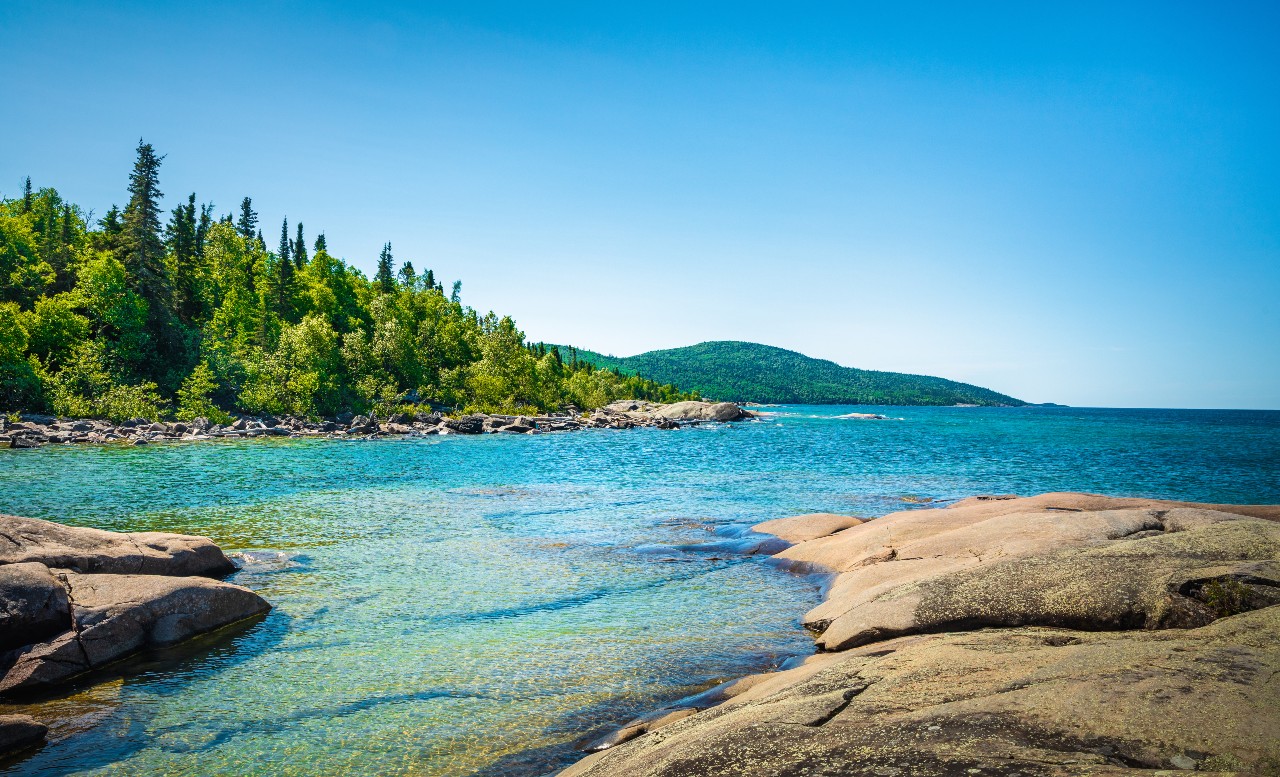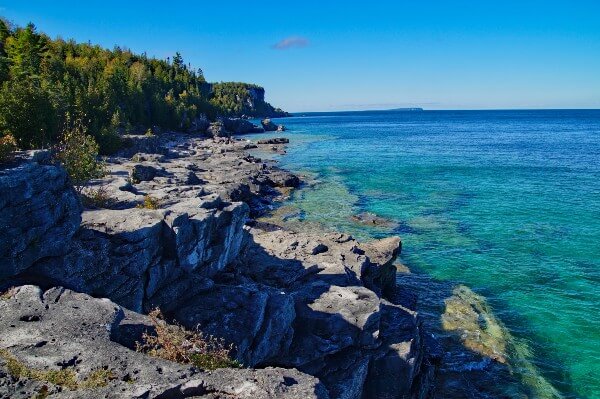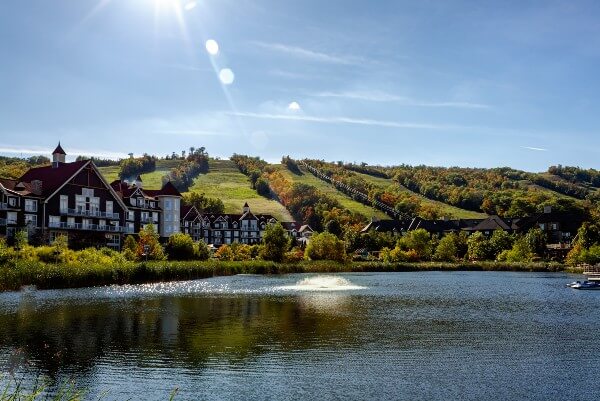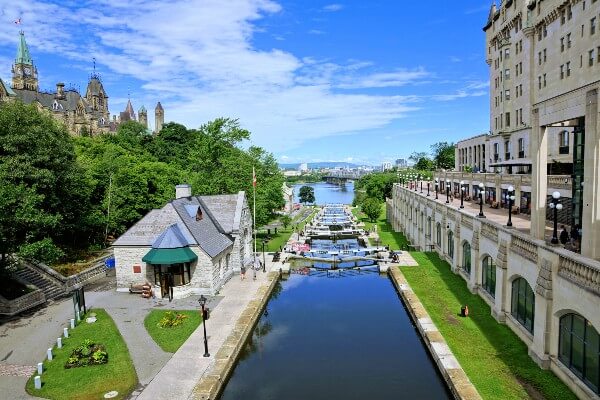
Boating in Ontario: What are the Best Boating Destinations in Ontario?
The great province of Ontario is brimming with diverse waterways for pleasure boaters to explore. From the Great Lakes to the Rideau Canal and everything in between, there are locations and activities to suit every taste and interest.
The experts at the National Boating Safety School have compiled a list of the best places to go boating in Ontario and just a few of the features that make them so special. If you’re planning a boating trip in Ontario, take a look—all of these destinations are yours to discover!
Lake of the Woods
We start our nautical journey at the southwestern tip of Ontario, on a lake that straddles the borders between Manitoba, Ontario and Minnesota. Lake of the Woods boasts 65,000 km of shoreline and over 14,500 islands. Its vastness provides many different areas to explore, from the more well-travelled water around Kenora and the surrounding cottage country to the vibrant fishing culture of Sioux Narrows and the more wild, untamed parts of the region.
If you’re looking for remote, untouched nature away from the summer boating crowds, you’ll be enthralled by the granite shorelines and boreal forest of Lake of the Woods. Just be sure to bring along your current charts and boating safety equipment when venturing beyond the Kenora area to ensure that you’re prepared for any eventuality!
The Great Lakes
As the world’s largest fresh surface water system, the Great Lakes are an iconic feature of Ontario. Together, they contain 21% of the world’s fresh surface water, and they provide drinking water for over 40 million people in North America.
The Great Lakes offer the most ocean-like boating experience in Ontario. With their rolling waves, strong winds and currents, profound depths and distant horizons, they are often called inland seas. Given those conditions, some of the Great Lakes, such as Superior and Erie, are best travelled in larger vessels. However, Lake Huron and Lake Ontario have some quieter coastlines that are appropriate for smaller recreational watercraft.
Georgian Bay
Georgian Bay, also known as the 30,000 islands, is the northeastern arm of Lake Huron. The area is quite rocky, but well-marked with marine buoys to indicate hazards and ensure safe passage.
With its treacherous shoals and changeable weather, the bay is home to many historical shipwrecks that are a major attraction for divers. The cold fresh water preserves the wrecks very well and the rock formations that proved so hazardous to the vessels form a stunning backdrop underwater. If you’re boating in Georgian Bay and enjoy diving, Fathom Five National Marine Park at Tobermory has 22 shipwrecks to discover!
Georgian Bay also has many great spots for fishing, but the Ontario government has fishing rules you should familiarize yourself with before casting your line. You’ll need a fishing license, and there are limits on when and where you can fish and how many you can keep.
Prefer to eat the fish without catching them yourself? Henry’s Restaurant on Frying Pan Island offers world-class fish and chips. The island is only accessible by water, so in the summer months, you’ll find floatplanes and boat taxis dropping off tourists by the dozens for freshly caught and fried fish.
Lake Nipissing
Just northeast of Georgian Bay is Lake Nipissing, a body of water that is famed for the speed with which it can become treacherous in bad weather. The often-challenging conditions are due to its shallow depth, low shoreline and orientation towards the prevailing winds. For this reason, smaller boats tend to stick to the bays and other sheltered areas.
Lake Nipissing is connected to Georgian Bay by the French River, a popular recreational boating area. The river has lots of little islands and bays to explore and many resorts that offer a place for you to anchor your boat for the night.
Muskoka Lakes
South of Lake Nipissing is Muskoka, one of Ontario’s most popular travel destinations. The area includes three main lakes, Lake Muskoka, Lake Rosseau and Lake Joseph, and attracts around 2.1 million visitors every year.
Beautiful cottages and boathouses dot the landscape, and the township maintains a fleet of steamships for scenic tours of the cottage country. The steamships in operation include the RMS Segwun, the oldest passenger steamship in North America that’s still in use.
The Trent-Severn Waterway
The Trent-Severn Waterway is a National Historic Site that runs 386 km from Port Severn on Georgian Bay to Trenton on Lake Ontario. In addition to boasting some of the best multi-species fishing grounds in Ontario, the waterway is home to a very unique lock.
Big Chute Marine Railway, located at lock 44, is a patent slip that uses an inclined plane to carry boats over a small hill between two bodies of water. Big Chute is the only marine railway of its kind that is still in operation in North America. It’s a one-of-a-kind experience that you won’t want to miss if you’re boating in the area!
Lake Simcoe
Lake Simcoe is located just an hour away from Toronto. It’s the perfect getaway spot for Torontonians who prefer a more pastoral atmosphere than the city beaches of Lake Ontario. Its proximity to Toronto means that it’s quite developed, with lots of cottages owned by people in the city.
Boaters will love this section of the Trent-Severn Waterway for its clear water and clean beaches, but it’s important to note that the lake is quite wide and shallow, meaning that it can quickly become choppy in rough weather. Try to remember to check the forecast before heading out, and keep an eye out for clouds that signal a change in weather conditions!
The Rideau Canal
The Rideau Canal is a 202 km waterway that stretches from Kingston to Ottawa. It was built after the war of 1812 to create an alternate supply route from Ottawa to the Great Lakes that did not require the use of the St. Lawrence River, which Canada shares with the United States.
The Rideau Canal is North America’s oldest canal that is still in operation, and many of its original elements have been preserved. Due to that and its link to an important chapter in North American history, it has been designated a UNESCO World Heritage Site. There are plenty of museums and historical sites along the canal that are sure to fascinate history enthusiasts!
The 1000 Islands
The 1000 Islands are an archipelago located where the St. Lawrence River emerges from the northeast corner of Lake Ontario. The area, which actually has over 1,800 islands, has been called one of the best places for cruising in the world.
The 1000 Islands have attractions for boaters of all kinds. The more open water close to Lake Ontario provides good winds for sailing. The archipelago is also a great place to observe the wildlife—it’s the second most biodiverse area in all of Canada. The area has a wealth of protected anchorages, beaches, fishing spots, boat tours, riverside towns and campgrounds to discover, and there are several castles that offer tours for those interested in the history of the region.
Get your Ontario boat license to discover the province’s waterways!
There’s no doubt that Ontario is a paradise for recreational boaters. Whether you’re interested in nature and wildlife or bustling market towns, diving, fishing or local history, the province’s diverse waterways have something for everyone.
Of course, in order to enjoy everything the waters of Ontario have to offer, you’ll need your Ontario boating license! By law, everyone who wants to operate a boat for recreational purposes in Canada must take a Transport Canada-approved boat safety course and pass an exam to obtain their pleasure craft operator card. Take our boating exam online to obtain yours and get set for the adventure of a lifetime!




